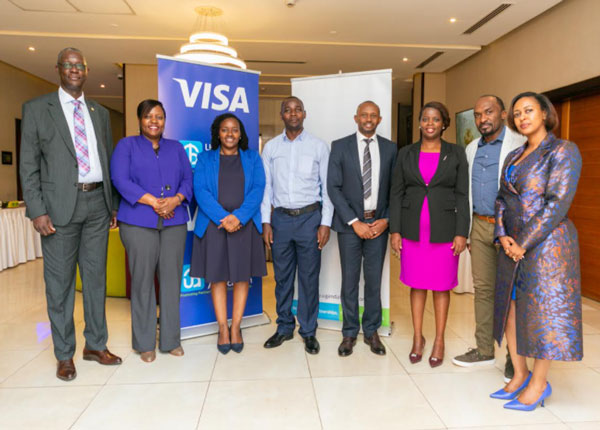
Kampala, Uganda | PATRICIA AKANKWATSA | VISA, a global leader in digital payments, has joined forces with the Uganda Bankers Association (UBA) to spearhead an innovative training program aimed at accelerating the growth of contactless payments in Uganda.
With a shared vision of advancing financial inclusion and promoting secure, convenient payment solutions, VISA and UBA collaborated to equip Ugandan bankers with the knowledge and tools needed to embrace the transformative potential of contactless payments.
This groundbreaking initiative aims to empower the banking sector and drive the adoption of contactless technology, fostering a future of seamless and efficient transactions for individuals and businesses across the country.
While speaking at the training, held at Golden Tulip Hotel in Kampala on July 19th, Wilbroad Owor the Executive Director of UBA said that such partnerships are important in this new digital space.
“Partnerships speak louder than anything else. The market is tough and some new players have come with solutions. A partner that brings new resolutions is an important one. VISA has strengthened security more than ever and any solution by a partner like VISA strengthens confidence,”
Contactless payments utilize Near Field Communication (NFC) technology, allowing users to make transactions by simply tapping or waving their contactless-enabled cards, smartphones, or other devices near the payment terminal. This eliminates the need for physical contact with payment devices, making transactions quicker and more hygienic, especially in a world shaped by the COVID-19 pandemic.
The adoption of contactless payments in Uganda has been accelerated by collaborations between global payment giants like VISA and local financial institutions, including banks and mobile money providers. As a result, various businesses, including supermarkets, restaurants, public transportation, and even street vendors, are increasingly accepting contactless payments.
According to Salma Ingabire the country director at VISA Uganda, Rwanda, Burundi and Tanzania, Uganda has more than 3 million cards but only 6% are on Point-On-Scale (POS).
“This percentage has not changed in a long time and the number of cards keeps increasing but the use is still low. Most people use the cards when they travel abroad. We need to create awareness about digital payments,” Ingabire said.
In recent years, contactless payments have gained attention worldwide for their ability to streamline transactions and enhance user convenience. This technology eliminates the need for physical contact with payment devices, making transactions faster and more hygienic an important consideration in a post-pandemic world.
Ingabire said that contactless payments provide convenience, allowing users to make swift transactions without the need to carry physical cash or wait for manual processing.
She also said that they contribute to improved security and protection against fraudsters.
“With embedded encryption technology and multiple layers of authentication, they offer enhanced protection against fraud and counterfeit activities compared to traditional payment methods. This can help build trust among consumers and increase their confidence in adopting digital payment solutions,”
However, Phyllis Kamau the head of government engagements said there are still some challenges, especially in the regulatory framework, especially in establishing clear regulations that safeguard consumer rights, protect against fraud, and encourage innovation can provide a conducive environment for industry stakeholders to invest in and promote contactless payment solutions.
“We need to educate the consumers about what they are signing up for and make them understand the benefits and security features of contactless payments, along with educating users on safe transaction practices, which is essential to foster trust and confidence in the technology,”
In conclusion, Owor called upon all bankers to popularize contactless payments, build on this partnership and strengthen it.
“Get more active, be hungry for innovation, embrace the partnership,”
 The Independent Uganda: You get the Truth we Pay the Price
The Independent Uganda: You get the Truth we Pay the Price



